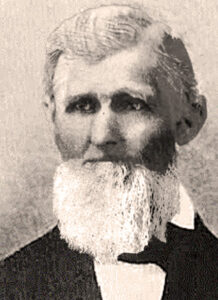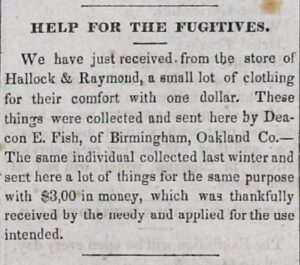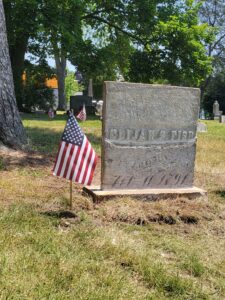
Elijah Fish was a pioneer settler of Birmingham who held strong abolitionist views and who founded (and became Deacon of) Birmingham’s First Presbyterian Church. He supported the abolitionist movement from early on, co-founding the Oakland County Anti-Slavery and Discussion Society in 1836 with fellow abolitionists George Wisner of Pontiac and Nathan Power of Farmington. Fish brought anti-slavery lecturers to Birmingham, provided funds and supplies to the UGRR, and worked with Black abolitionist Henry Bibb to purchase property in Ontario for resettlement of freedom seekers. His burial site at Greenwood Cemetery in Birmingham is listed on the UGRR Network to Freedom.

Elijah Fish came with his young family to the wilderness of Birmingham in 1820. He was one of the first to purchase land and clear it to make a new life in the territory of Michigan. He was a fair-minded, even-tempered man who came from a humble background with a limited education, but he was to become an important voice in the anti-slavery movement in Oakland County. Alongside fellow abolitionists like George Wisner, Nathan Power, and Joseph Morrison, Fish believed in the fundamental right of freedom for all, and he helped organize events that shaped the values of the people who later opened their homes to freedom seekers fleeing enslavement through Oakland County.

Fish, although unschooled himself, believed in open discussion and education of everyone, especially in regards to the fundamental rights of all people to freedom and liberty and the end of slavery. He worked to bring nationally known anti-slavery lecturers to Birmingham to help raise awareness of these issues in his home community. These included men like William Cooper Nell, a free Black abolitionist and formerly enslaved Black abolitionist Henry Bibb. During this period, Fish was committed to helping Bibb acquire land in Canada for the Refugee Home Society, an organization whose goals were to buy land and sell it at a discount to formerly enslaved freedom seekers who wanted to become self-sufficient on their own land in Ontario. Fish also gave funds to support Underground Railroad activities.
During the late 1850s, Elijah Fish gradually became too ill to continue his work. Unfortunately, he died before realizing his vision of a United States without slavery. At his death, his family inscribed his grave marker with the following:
Elijah Fish was buried in Greenwood Cemetery in Birmingham, Michigan. In 2022, more than 150 years after his death, his contributions to the Underground Railroad were recognized by the National Park Service’s Underground Railroad Network to Freedom by listing his burial site in a national database.



For More Information
Elijah Fish and the Underground Railroad article by Donna Casaceli, Birmingham Museum
Casaceli, Donna. “Birmingham’s Connection to the Underground Railroad: Deacon Elijah Staunton Fish—Abolitionist,” Birmingham Museum, 2021. Biography of Elijah Fish with images of news clippings of his abolitionist activities during the 1830s-1850s. Complete bibliography.
Acknowledgements
Primary research on Elijah Staunton Fish contributed by Donna Casaceli, Birmingham Museum
Narrative by Leslie Pielack, Birmingham Museum